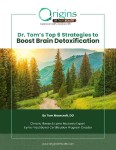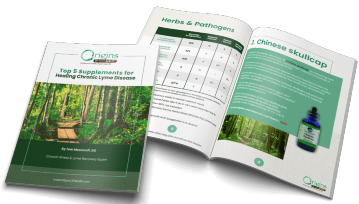Chronic Toxin Overload: The Real Cause of Fibromyalgia and Chronic Fatigue Syndrome
By: Tom Moorcroft, DO
Patients who suffer from unrelenting fatigue, persistent pain and brain fog are often diagnosed with chronic fatigue syndrome and/or fibromyalgia. Interestingly, neither of these diagnoses actually points to a cause of illness; they both are merely labels for a group of symptoms. Unfortunately, this leaves patients with little more than another name for their condition. Without finding a cause of their illness, they have little hope of regaining their previous state of health. This article covers the signs and symptoms that lead to a “diagnosis” of chronic fatigue or fibromyalgia; reviews the clues these symptoms offer us; and provides a deeper understanding of the possible causes of these syndromes. A better understanding of actual causes can help chronic fatigue and fibromyalgia sufferers regain their health and live the life they want.
Fibromyalgia Syndrome
Fibromyalgia is a common syndrome in which people experience long-term, body-wide pain and tender points in muscles, tendons, and other soft tissues. Fibromyalgia is seen in men and women of all ages, but is most common in women between the ages of 20 and 55. Pain is generally located on both sides of the body as well as above and below the waist. The pain is predominantly located in the muscles, sparing the joints. The pains are easily aggravated by mild physical activity. More than 50% of patients also report having regular headaches.
While pain and tenderness are hallmarks of this syndrome, those who suffer with fibromyalgia experience many other symptoms including fatigue, cognitive changes (often called fibrofog or brain fog), and mood disturbances. Patients often report numbness and tingling in the extremities. Many patients also experience non-restorative sleep, and wake up feeling stiff and unrefreshed in the morning. Profound afternoon fatigue is common. As with the muscle pain, fatigue is easily aggravated by minimal activity. At times, the brain fog is so significant that it leads to problems with attention and performance. Patients report they have difficulty multitasking or dealing with tasks that involve rapid thought changes. Patients also report several other concerning symptoms including eye dryness, multiple chemical sensitivity, heart palpitations, shortness of breath, sexual dysfunction, weight fluctuations, night sweats, difficulty swallowing, dizziness when getting up from a seated or lying position, and menstrual irregularities.
People diagnosed with fibromyalgia often have coexisting depression and/or anxiety disorders, however neuropsychiatric testing reveals that these patients are in fact different than patients with typical depression or anxiety. To compound matters, patients often appear to be well, lab tests are usually normal, and the patient’s physical exam is typically normal with the exception of tender points. Physicians often feel fibromyalgia is psychosomatic. Psychosomatic problems are essentially caused within the brain and psyche. In other words, it’s all in your head. This is very distressing to hear for someone who is experiencing real symptoms that prevent them from enjoying life.
Since many practitioners believe fibromyalgia is psychosomatic, conventional treatment focuses on patient education and medications that affect the brain. Education is commonly used to help patients gain an increased sense of control over pain and let them know that their pain is not a sign of physical damage. Patients are often referred for cognitive behavioral therapy with a psychotherapist. Medications commonly used include antidepressants, pain relievers, and, at times, anti-seizure medications.
As you may have noticed, there are relatively few treatment options for fibromyalgia syndrome. This is probably due to the fact that fibromyalgia is a term that is used to describe a group of symptoms for which there is no known cause. Fibromyalgia sufferers often feel hopeless as no one can truly tell them what’s wrong. Later in this article we will discuss a structured approach for determining the likely cause or causes of fibromyalgia. This opens up vast possibilities for effective treatment options and renewed hope of regaining health.
Chronic Fatigue Syndrome
Chronic fatigue syndrome (CFS) is likely the most common “cause” of persistent fatigue in our society today. Since the mid-1700s, patients have been complaining about new onset, profound fatigue that never seems to go away. Since this time, physicians and researchers have struggled to find the cause. Interestingly, persistent infection has often been looked at as a possible cause, however, until recently, there has been little convincing evidence of this.
Patients with CFS report that they have persistent overwhelming fatigue that started abruptly more than six months ago. This fatigue is severe enough to decrease their normal activity level by more than 50%, with some patients being almost completely bedridden. Many patients also experience post-exertion fatigue that lasts more than 24 hours. Prior to the onset of fatigue, patients are usually high functioning and many are physically active. Other common symptoms include achy joints, feeling feverish, muscle pain and muscle fatigue, and swollen lymph nodes. Patients also report generalized headaches, migratory joint pains, brain fog, sensitivity to light, and sleep disturbances, including non-restorative sleep.
Does this sound familiar? One of the most interesting things to me when looking at these two syndromes is that essentially all of the symptoms of fibromyalgia are also seen in CFS. It is almost as if fibromyalgia is a subset of CFS. This leads me to believe that there must be significant similarities in the agents that are causing these two syndromes…another clue, but more on that later.
The Centers for Disease Control and Prevention (CDC) has set forth diagnostic criteria for CFS. These criteria require that fatigue be unexplained, persistent or relapsing as well as have a definite time of onset. Additionally fatigue must not be relieved by rest and must result in a substantial reduction in the person’s previous personal or professional activities. If these criteria are met then patients must also have four or more of a list of symptoms that are similar to those I described above. Interestingly there is again no mention of abnormal lab tests as part of the diagnosis of chronic fatigue syndrome, however physicians typically order lab tests to rule out other causes of fatigue. In CFS patients there are often many lab abnormalities, but they do not seem to point directly at a cause of the patient’s fatigue. After conventionally understood medical causes have been ruled out, these unexplained lab abnormalities are commonly discarded. Some of these lab abnormalities include alterations in cortisol (one of our main stress hormones) function, lower levels of immune system function and elevated levels of antibodies to viruses and bacteria…more clues.
Until recently there have been very few conventional treatment options for patients diagnosed with CFS. Over the last several years many researchers have started to look at the role of persistent viral infections as possible causes for CFS. Current research has identified 3 viruses as possible causes: Epstein-Barr virus, cytomegalovirus, and human herpes virus 6 (which causes roseola in children). Several researchers are now looking at treatment with long term use of antiviral medications and are having good success. Despite the recent progress in looking outside of the box for the true underlying cause of CFS, physicians and researchers continue to look at patients who have it with skepticism. Patients are often treated similarly to fibromyalgia patients…it’s all in your head.
Searching for the Cause
As someone who was previously diagnosed with CFS and fibromyalgia syndrome, I can attest that it is possible to regain your health and live the life you want. I can also tell you that it is unlikely you will find one cause of all your symptoms. Throughout my years as a patient and physician, I’ve come to learn that we are complex organisms that live in a complex world. The illnesses, symptoms, diagnoses and dis-eases we suffer from are also very complex. In order to heal, it is my opinion that we must view each individual patient in light of this complexity.
The difficulty with looking at a complex picture through the eyes of an overly complex conventional medical system is that the complexity mounts and finding the true cause of dis-ease becomes increasingly difficult. The beauty of looking at a complex picture and appreciating its complexity without any preconceived notion of how healing should or must occur is that everything becomes much more simple and the answer obvious. This does not mean that healing will miraculously occur within one week of seeing your symptoms in this new light. What it does mean is that you and your health care provider will be able to come up with a straightforward, logical approach to getting you back on the road to health.
The Role of Toxins
In my search for health I constantly ran into roadblocks. These roadblocks were often called Herxheimer reactions, die-off reactions, healing crises, or even vital reactions. I was told these reactions were part of the healing process and that I would need to go through them. Some providers suggested I take supplements to increase the removal of toxins, but their recommendations were generic and I never felt I was given a good explanation of what the actual toxins were. I learned that each person and their illness are unique and that I needed to learn more about toxins.
So what is a toxin? Technically speaking a toxin is a poisonous substance created by living cells or organisms. In today’s world this term also applies to human-made substances that are poisonous. In my experience, a toxin is anything that exerts a force on a person that he or she must exert an equal and opposite force on in order to maintain balance. For example, if it’s cold outside, the body must maintain its core temperature. This is commonly done through shivering. In this example, cold is a toxin. Cold is not typically thought of as a toxic substance, but it does exert a force on the person that must be balanced and is therefore a toxin. The relevance of this example will become clearer as we look at the impact of multiple toxins on health.
Health vs. Dis-ease
When our bodies are in balance with all the things that are pushing in on us, we are able to maintain a state of health. When the force applied on us is too great, a state of imbalance results. It is not that there is something innately wrong, rather there is a lack of ease in the system that maintains health. Over time, if toxins are not addressed and they build up, this state of imbalance leads to a pathological condition or dis-ease.
Chronic Toxin Overload
In my experience, almost all dis-eases are a result of Chronic Toxin Overload (CTO). I created the concept of CTO to allow us to look at each person as an individual and fully evaluate the variety of different toxins impacting him or her on a daily basis. It allows us to identify imbalances in a person’s health and address them utilizing the very best of conventional and alternative medicine. Looking at a patient’s life situation from a perspective of CTO allows us to compassionately address imbalances in the person’s physical, mental, emotional, and spiritual being. It allows for a more structured and comprehensive approach to treatment. This comprehensive view of diagnosis and treatment consistently results in patients regaining their health.
CTO provides us with a framework that allows us to understand that one toxin is rarely the problem. As an Osteopathic physician, I was trained that each person has self-healing mechanisms that maintain health. I often wondered, “then why do people get sick?” These self-healing mechanisms were designed to deal with a few discrete toxins at a time. When the body is exposed to only a few toxins self-healing can take place and the experience of symptoms is very minimal. Today, people are bombarded with multiple toxins at all times. If you walk down the hallway at work you’ll likely be exposed to numerous bacteria, many viruses, several molds, some fungus, irritable co-workers, fluorescent lights, cell phones, computer screens, and a sense of urgency to get to the meeting you’re late for. And, realistically, this list is much, much longer.
The point is that we all experience a tremendous amount of pressure from the outside world that our systems need to push back against in order to maintain balance and health. There is only so much toxic stress our bodies can deal with before this balance is lost and they begin to breakdown. Because people are no longer getting sick from one or two toxins, but rather a myriad of toxins, doctors often are unable to isolate a single cause of illness and erroneously believe it is all in their patient’s head. By looking at all of the possible chronic toxin exposures a patient may have, the physician is more easily able to make sense out of their symptoms and create a roadmap towards health.
Regaining Your Health
In order to truly start down the road to regaining your health, it is important to be brutally honest with yourself and your physician. Many of the chronic toxins we are exposed to are obvious to a well-trained professional, however others may be as simple as a deep-seated, reoccurring negative thought or emotion in our head. These more subtle mental and emotional toxins are critical to address if you are to truly get well again.
I would suggest that all illnesses in one way or another are significantly impacted by Chronic Toxin Overload (CTO) and the key to healing from any dis-ease is to:
1. Detoxify
2. Purify
3. Amplify
Detoxify
Detoxify the body, mind and spirit. We live in a world where we’re inundated by various toxins. In addition to the external toxins that bombard us on a daily basis, there are a variety of microorganisms that attack us internally. Many of the causes of chronic fatigue and chronic pain are actually these undiagnosed microorganisms. The interesting thing about these microorganisms is that they have the ability to alter the internal environment of our bodies specifically by releasing biotoxins as well as altering messenger molecules. This results in a block of your body’s self-healing mechanisms and detoxification pathways. When these microorganisms are eventually killed by your body or by the use of herbs or medications, many of them also release internal toxins as they die. This in addition to all the other physical, mental and emotional toxins that our bodies need to deal with leads to a significant buildup of toxic materials.
The foundation of any truly effective healing approach is to promote detoxification. This can be done in a variety of ways, including improving our diets, appropriate exercise, and appropriate use of detoxifying nutritional supplements and herbs. It is also a key to address mental and emotional stressors through an appropriate avenue such as counseling, meditation, journaling, qi gong, tai chi, or yoga.
Another critical element is balancing our energetic systems and protecting ourselves from the deleterious effects of electromagnetic fields (EMF). Since most of us are unable to get away from cell phone towers, cordless phones, computer screens and the like, the best way to do this is by supporting our energetic systems by wearing a pendant or other type of jewelry that has a tuning and balancing effect on our energetics. It is also possible to utilize EMF blocking technology in our homes and places of work. Protecting ourselves from EMFs and balancing our energetic systems helps maintain balance and optimize natural detoxification.
By starting our healing work with a focus on detoxification we can ensure that we are safely and effectively mobilizing toxins and our body is ready to deal with an increased toxin load as we work to remove the source of these toxins.
Purify
Purify the body, mind and spirit by decreasing the buildup of toxins. Once we have reestablished the flow of toxins out of the body, it is time to focus on removing the causes of the toxin buildup in the first place. Many of the common sources of toxin buildup are summarized in the illustration that accompanies this text. Some of the most common causes of toxin buildup in CFS and fibromyalgia include persistent bacterial, viral, yeast and/or mold infections, heavy metal toxicity, low vitamin D levels, subclinical hypothyroidism, chronically elevated levels of stress, and chronic exposure to electromagnetic forces.
The most common persistent bacterial infections include Lyme disease, Babesiosis and Bartonella. Persistent viral infections leading to chronic toxin overload include Epstein-Barr virus, cytomegalovirus and human herpes virus six (the causative agent of roseola in children). Yeast often becomes a problem due to the high levels of processed foods and sugar in the standard American diet. The use of antibiotics without appropriate probiotics is another cause of yeast overgrowth. Molds are hidden everywhere. Many people are exposed to molds at home, work or school and do not even know it. Sources of heavy metal toxicity include contaminated drinking water, dental amalgams and air pollution. Almost everyone who lives in Connecticut is toxic from lack of sunshine which leads to vitamin D deficiency. Many people develop subclinical or full-blown hypothyroidism due to chronic exposure to fluoride in toothpaste, bromine in breads and chlorine in water, which all displace iodine from the thyroid gland. Most of us lead lives that are filled with stress, both physical and emotional. If we do not develop systems to help us stay in balance these stressors become toxic.
It is common for many people to eat the same types of food every day. How many people do you know who have a bread product at least once a day? While some people have food allergies, it is more common to become hypersensitive to a certain food because it is eaten too frequently. Food hypersensitivities lead to allergy-like symptoms, gastrointestional problems and even pain and fatigue. As the colon is one of the largest organs of detoxification in the body, creating food hypersensitivities through incorrect eating habits leads to decreased ability to detoxify and Chronic Toxin Overload. The colon is also a major part of the immune system. Disruption of colon function through CTO can lead to suppression of the immune system and decreased ability to deal with toxins, especially infections.
Each of these chronic toxins needs to be addressed until the toxin load has been decreased to the point where the self-healing mechanism is able to regain control and maintain balance.
Amplify
Amplify the function of the immune system so it can rebalance the systems that have been thrown out of balance by Chronic Toxic Overload. The immune system is the driving force behind maintaining optimal detoxification in the body. It identifies foreign invaders and eliminates them. When the body is overwhelmed by toxins, the immune system becomes suppressed. When it is functioning at the highest level, identification and elimination occur freely and easily, for the body only needs to deal with small amounts of toxins at a given time. Amplification makes the immune system more powerful. It regains control over the balance of health and dis-ease. There are many approaches to amplifying the immune system. Each patient must have an individualized immune system support plan created for them. The key is to slowly amplify immune system function after detoxification and purification are well established. If we move too quickly in this step, enhanced immune function may lead to increased toxin burden that the body is unable to eliminate; in other words, if we go too fast we can actually make our patients worse.
Applying CTO to Chronic Fatigue and Fibromyalgia
As a physician who specializes in the treatment of chronic fatigue, pain and brain fog, I commonly see patients who have been diagnosed with one of these syndromes. They have often seen 5, 10, 15 or more doctors and have truly lost hope that they will ever get better. These are the patients who benefit the most from the concept of Chronic Toxin Overload. This model allows us to look at them as unique individuals and see where their symptoms are actually coming from. Not everyone has the same fatigue. No one’s pain is the same as someone else’s. We start by identifying where the most likely blockages to detoxification are and then work to open them. Next we look at all the possible causes of toxin build up. Once they are identified, we are able to create a treatment plan to purify the body of these toxins. Once we have unloaded some of the toxic burden, we focus on rebuilding and amplifying the immune system so it can maintain health.
The take home message for suffers of CFS and fibromyalgia is that there is hope. By bringing CFS and fibromyalgia out into the open and exposing them for what they are – descriptions – we can apply the concept of Chronic Toxin Overload to help them regain their health and live the life they want.
About the author:
Dr. Tom Moorcroft, DO specializes in the integrative treatment of chronic fatigue, pain and brain fog at Origins Of Health in Berlin, CT.



